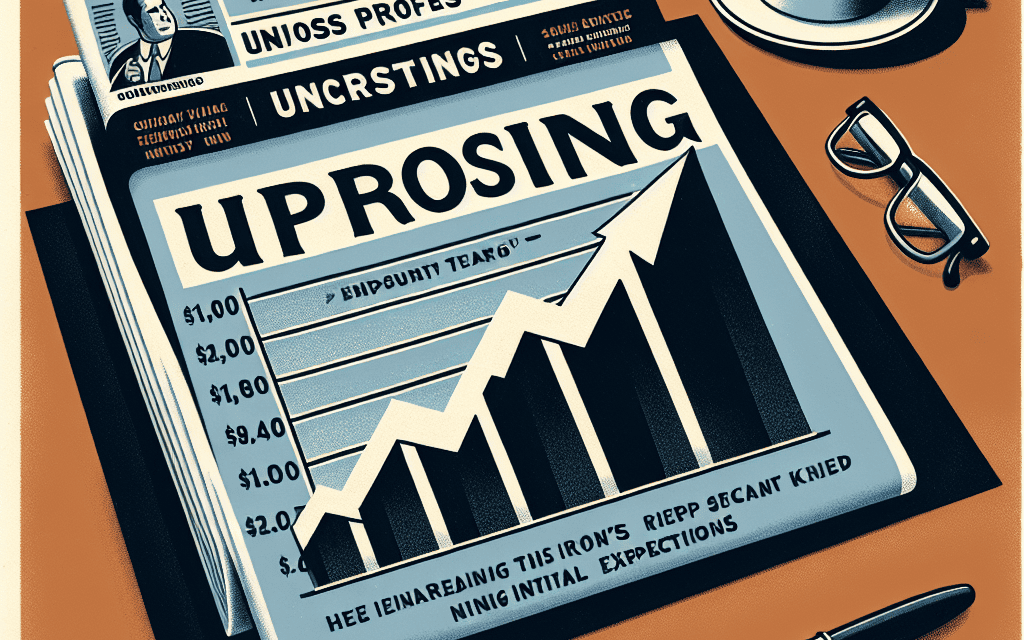“Berkshire Hathaway: Defying Odds, Surpassing Expectations.”
Introduction
Berkshire Hathaway, the multinational conglomerate led by renowned investor Warren Buffett, recently reported earnings that exceeded initial market expectations, showcasing its robust financial health and strategic acumen. The company’s diverse portfolio, spanning insurance, utilities, railroads, and a variety of other sectors, contributed to this impressive performance. Strong operational results, coupled with astute investment decisions, have underscored Berkshire Hathaway’s resilience and adaptability in a dynamic economic landscape. This earnings report not only highlights the conglomerate’s ability to navigate challenges but also reinforces its position as a formidable player in the global market.
Analyzing Berkshire Hathaway’s Unexpected Earnings Surge
Berkshire Hathaway, the multinational conglomerate led by the legendary investor Warren Buffett, has once again captured the attention of the financial world with its latest earnings report. Surpassing initial expectations, the company’s performance in the recent quarter has been nothing short of remarkable. This unexpected earnings surge has prompted analysts and investors alike to delve deeper into the factors contributing to this success, as well as the implications for the broader market.
To begin with, one of the primary drivers behind Berkshire Hathaway’s impressive earnings has been its diverse portfolio of subsidiaries and investments. The conglomerate’s holdings span a wide range of industries, including insurance, utilities, manufacturing, and retail. This diversification has allowed the company to mitigate risks associated with sector-specific downturns, thereby ensuring a more stable revenue stream. In particular, the insurance segment, which includes GEICO and Berkshire Hathaway Reinsurance Group, has performed exceptionally well, benefiting from favorable underwriting conditions and a relatively low incidence of catastrophic events.
Moreover, the company’s strategic investments in publicly traded equities have also played a crucial role in bolstering its earnings. Notably, Berkshire Hathaway’s significant stakes in technology giants such as Apple have yielded substantial returns, as these companies continue to thrive in an increasingly digital world. The appreciation in the value of these investments has not only contributed to the bottom line but has also reinforced the conglomerate’s reputation for astute capital allocation.
In addition to its investment prowess, Berkshire Hathaway’s operational efficiency has been a key factor in its earnings outperformance. The company’s management team, known for its disciplined approach to cost control and resource allocation, has successfully navigated the challenges posed by inflationary pressures and supply chain disruptions. By maintaining a lean operational structure and focusing on long-term value creation, Berkshire Hathaway has been able to enhance its profitability even in a volatile economic environment.
Furthermore, the conglomerate’s strong cash position has provided it with the flexibility to pursue opportunistic acquisitions and share repurchases. This financial strength has not only enabled Berkshire Hathaway to capitalize on attractive investment opportunities but has also instilled confidence among shareholders regarding the company’s future growth prospects. The recent earnings report has underscored the effectiveness of this strategy, as evidenced by the positive market reaction and subsequent increase in the company’s stock price.
While the earnings surge is undoubtedly a testament to Berkshire Hathaway’s robust business model, it also raises important considerations for the broader market. The company’s performance serves as a reminder of the value of diversification and prudent risk management, particularly in times of economic uncertainty. Additionally, it highlights the importance of maintaining a long-term investment horizon, as evidenced by the success of Berkshire Hathaway’s equity holdings.
In conclusion, Berkshire Hathaway’s unexpected earnings surge has reaffirmed its status as a bellwether of the American economy. The conglomerate’s ability to consistently deliver strong financial results, despite the myriad challenges facing the global market, is a testament to its sound business strategy and exceptional leadership. As investors and analysts continue to assess the implications of this earnings report, it is clear that Berkshire Hathaway remains a formidable force in the world of finance, with a proven track record of navigating complex market dynamics and generating sustainable value for its shareholders.
Key Factors Behind Berkshire Hathaway’s Earnings Outperformance
Berkshire Hathaway’s recent earnings report has captured the attention of investors and analysts alike, as the conglomerate’s financial performance surpassed initial expectations. This outperformance can be attributed to several key factors that have collectively contributed to the robust earnings. Understanding these elements provides valuable insights into the company’s strategic positioning and operational efficiency.
To begin with, one of the primary drivers of Berkshire Hathaway’s earnings success is its diversified portfolio. The conglomerate, under the astute leadership of Warren Buffett, has strategically invested in a wide array of industries, ranging from insurance and energy to consumer goods and transportation. This diversification has allowed the company to mitigate risks associated with sector-specific downturns, thereby ensuring a stable revenue stream. For instance, while some sectors faced challenges due to macroeconomic fluctuations, others experienced growth, effectively balancing the overall performance.
Moreover, the insurance segment, a cornerstone of Berkshire Hathaway’s business model, has played a pivotal role in the earnings outperformance. The company’s insurance subsidiaries, including GEICO and Berkshire Hathaway Reinsurance Group, have demonstrated strong underwriting results. This success is largely due to disciplined risk management practices and a focus on maintaining adequate pricing. Additionally, the float generated from insurance operations has provided Berkshire Hathaway with substantial capital to invest in other ventures, further enhancing its earnings potential.
In addition to the insurance sector, Berkshire Hathaway’s investments in the energy sector have yielded significant returns. The company’s energy subsidiary, Berkshire Hathaway Energy, has benefited from strategic acquisitions and investments in renewable energy projects. As the global demand for sustainable energy solutions continues to rise, these investments have positioned the company to capitalize on emerging opportunities. Consequently, the energy segment has contributed positively to the overall earnings, underscoring the importance of forward-thinking investment strategies.
Furthermore, Berkshire Hathaway’s equity portfolio has also been a significant contributor to its earnings outperformance. The company’s substantial holdings in blue-chip stocks, such as Apple and Coca-Cola, have appreciated in value, reflecting the strength of these underlying businesses. The strategic selection of high-quality stocks with strong growth potential has enabled Berkshire Hathaway to generate substantial capital gains, thereby bolstering its financial results.
Another factor that has supported Berkshire Hathaway’s earnings is its operational efficiency. The conglomerate’s decentralized management structure empowers subsidiary companies to operate autonomously, fostering a culture of innovation and agility. This approach has allowed individual businesses to respond swiftly to market changes and optimize their operations, ultimately enhancing profitability. The ability to adapt and thrive in a dynamic business environment has been instrumental in driving the company’s earnings growth.
Lastly, it is important to acknowledge the role of prudent financial management in Berkshire Hathaway’s success. The company’s conservative approach to debt and its emphasis on maintaining a strong balance sheet have provided a solid foundation for sustainable growth. This financial discipline has enabled Berkshire Hathaway to navigate economic uncertainties with resilience, ensuring that it remains well-positioned to seize future opportunities.
In conclusion, Berkshire Hathaway’s earnings outperformance can be attributed to a combination of strategic diversification, strong performance in key sectors, astute investment decisions, operational efficiency, and prudent financial management. These factors have collectively reinforced the conglomerate’s position as a formidable player in the global business landscape, and they continue to drive its success in an ever-evolving economic environment. As Berkshire Hathaway moves forward, these elements will likely remain central to its ongoing growth and profitability.
How Berkshire Hathaway’s Earnings Beat Market Predictions
Berkshire Hathaway, the multinational conglomerate led by the renowned investor Warren Buffett, has once again demonstrated its robust financial acumen by surpassing market expectations in its latest earnings report. This achievement not only underscores the company’s resilient business model but also highlights its strategic investments and diversified portfolio, which have collectively contributed to its impressive financial performance.
To begin with, Berkshire Hathaway’s earnings report revealed a significant increase in net income, driven by strong performances across its various subsidiaries. The company’s diverse holdings, which span industries such as insurance, energy, railroads, and consumer goods, have provided a stable foundation for growth. Notably, the insurance segment, which includes GEICO and Berkshire Hathaway Reinsurance Group, played a pivotal role in bolstering the company’s earnings. Despite the challenges posed by natural disasters and fluctuating market conditions, the insurance division managed to deliver solid underwriting results, thereby enhancing the overall profitability of the conglomerate.
Moreover, Berkshire Hathaway’s strategic investments in publicly traded companies have also contributed to its earnings beat. The company’s substantial stakes in blue-chip stocks such as Apple, Coca-Cola, and Bank of America have yielded significant returns, particularly as these companies have continued to perform well in the market. Apple’s consistent innovation and strong consumer demand for its products have translated into substantial gains for Berkshire Hathaway, while Coca-Cola’s global brand presence and Bank of America’s financial stability have further reinforced the conglomerate’s investment portfolio.
In addition to its successful investments, Berkshire Hathaway’s operational efficiency has been a key factor in its ability to exceed market predictions. The company’s management team, led by Buffett and his long-time partner Charlie Munger, has consistently emphasized cost control and prudent capital allocation. This disciplined approach has enabled Berkshire Hathaway to maintain a strong balance sheet, providing the flexibility to seize new investment opportunities as they arise. Furthermore, the company’s focus on long-term value creation, rather than short-term gains, has resonated well with investors, contributing to its sustained financial success.
Another aspect that has played a crucial role in Berkshire Hathaway’s earnings performance is its commitment to innovation and adaptation. The conglomerate has made strategic moves to invest in emerging sectors, such as renewable energy and technology, which are poised for significant growth in the coming years. By positioning itself at the forefront of these industries, Berkshire Hathaway is not only diversifying its revenue streams but also ensuring its relevance in an ever-evolving market landscape.
While the company’s recent earnings report has undoubtedly exceeded expectations, it is important to acknowledge the broader economic context in which these results were achieved. The global economy has been navigating a complex landscape characterized by inflationary pressures, supply chain disruptions, and geopolitical tensions. Despite these challenges, Berkshire Hathaway’s ability to deliver strong financial results is a testament to its resilient business model and strategic foresight.
In conclusion, Berkshire Hathaway’s latest earnings report serves as a compelling reminder of the company’s enduring strength and adaptability. By leveraging its diversified portfolio, strategic investments, and operational efficiency, the conglomerate has not only surpassed market predictions but also reinforced its position as a formidable player in the global business arena. As Berkshire Hathaway continues to navigate the complexities of the modern economy, its commitment to long-term value creation and innovation will undoubtedly remain central to its ongoing success.
The Impact of Berkshire Hathaway’s Earnings on Stock Performance

Berkshire Hathaway’s recent earnings report has exceeded initial expectations, marking a significant moment for investors and analysts alike. This development has not only underscored the conglomerate’s robust financial health but also had a notable impact on its stock performance. As the market digests this information, it is essential to explore how these earnings have influenced investor sentiment and the broader implications for the stock’s trajectory.
To begin with, Berkshire Hathaway’s earnings report revealed a substantial increase in net income, driven by strong performances across its diverse portfolio of businesses. This impressive financial outcome can be attributed to several factors, including strategic acquisitions, effective management, and a favorable economic environment. The conglomerate’s ability to generate significant profits from its insurance, energy, and manufacturing sectors has reinforced its reputation as a resilient and adaptable entity. Consequently, this financial success has instilled confidence among investors, leading to a positive reaction in the stock market.
In the wake of the earnings announcement, Berkshire Hathaway’s stock experienced an upward trend, reflecting the market’s approval of the company’s financial performance. Investors, buoyed by the better-than-expected results, have shown increased interest in the stock, driving up its price. This surge in stock value can be seen as a testament to the market’s faith in Berkshire Hathaway’s long-term growth prospects. Moreover, the earnings report has provided a renewed sense of optimism, encouraging both existing and potential investors to consider the stock as a viable investment opportunity.
Furthermore, the impact of Berkshire Hathaway’s earnings on its stock performance extends beyond immediate price movements. The company’s strong financial results have also prompted analysts to revise their forecasts and recommendations. Many financial experts have upgraded their outlook for Berkshire Hathaway, citing its solid earnings as a key factor in their revised assessments. This shift in analyst sentiment has further bolstered investor confidence, creating a positive feedback loop that continues to support the stock’s upward momentum.
In addition to influencing investor sentiment, Berkshire Hathaway’s earnings have also had broader implications for the stock market as a whole. As one of the largest and most influential companies in the world, its financial performance serves as a barometer for the overall health of the economy. The company’s ability to thrive in various market conditions provides valuable insights into the resilience of different sectors and industries. Consequently, Berkshire Hathaway’s earnings report has not only impacted its own stock performance but also offered a glimpse into the broader economic landscape.
Moreover, the positive earnings report has highlighted the importance of diversification and strategic management in achieving financial success. Berkshire Hathaway’s diverse portfolio of businesses has allowed it to weather economic fluctuations and capitalize on emerging opportunities. This approach has proven to be a key driver of the company’s impressive earnings, reinforcing the value of diversification as a strategy for long-term growth. As investors consider their own portfolios, the lessons from Berkshire Hathaway’s success may serve as a guiding principle in navigating the complexities of the stock market.
In conclusion, Berkshire Hathaway’s earnings have surpassed initial expectations, significantly impacting its stock performance and influencing investor sentiment. The company’s strong financial results have not only driven up its stock price but also prompted analysts to revise their forecasts. As a result, Berkshire Hathaway’s earnings report has provided valuable insights into the broader economic landscape and underscored the importance of diversification and strategic management. As the market continues to respond to this development, the implications for both the company and the stock market remain profound.
Warren Buffett’s Strategy: A Closer Look at Berkshire’s Earnings Success
Berkshire Hathaway, the multinational conglomerate led by the legendary investor Warren Buffett, has once again demonstrated its financial prowess by surpassing initial earnings expectations. This achievement not only underscores the effectiveness of Buffett’s investment strategy but also highlights the resilience and adaptability of the conglomerate’s diverse portfolio. As investors and analysts delve into the details of Berkshire’s recent financial performance, it becomes evident that several key factors have contributed to this success.
To begin with, one cannot overlook the strategic allocation of capital that has been a hallmark of Buffett’s approach. By carefully selecting investments that promise long-term value, Berkshire Hathaway has consistently managed to outperform market expectations. This strategy is evident in the company’s substantial holdings in blue-chip stocks such as Apple, Coca-Cola, and American Express. These investments have provided a stable foundation for growth, even amidst fluctuating market conditions. Furthermore, Buffett’s emphasis on acquiring companies with strong fundamentals and competitive advantages has ensured that Berkshire’s portfolio remains robust and diversified.
In addition to strategic investments, Berkshire Hathaway’s earnings success can be attributed to its diverse range of subsidiaries. The conglomerate’s business interests span various sectors, including insurance, energy, transportation, and consumer goods. This diversification not only mitigates risk but also allows the company to capitalize on opportunities across different industries. For instance, the insurance arm, led by GEICO and Berkshire Hathaway Reinsurance Group, has consistently delivered strong results, contributing significantly to the overall earnings. Similarly, the energy sector, with Berkshire Hathaway Energy at the helm, has benefited from the global shift towards sustainable energy solutions, further bolstering the company’s financial performance.
Moreover, the disciplined management of operating costs has played a crucial role in enhancing Berkshire Hathaway’s profitability. By maintaining a lean operational structure and focusing on efficiency, the conglomerate has been able to maximize returns on its investments. This approach is particularly evident in the manufacturing and retail segments, where cost control measures have led to improved margins and increased competitiveness. As a result, Berkshire Hathaway has been able to weather economic uncertainties and emerge stronger, reinforcing its position as a leader in the global market.
Another factor contributing to Berkshire’s earnings success is the prudent use of cash reserves. Known for maintaining a substantial cash position, Buffett has strategically deployed these reserves to seize attractive investment opportunities during market downturns. This opportunistic approach has allowed Berkshire to acquire valuable assets at favorable prices, thereby enhancing its long-term growth prospects. Additionally, the company’s share repurchase program has been instrumental in boosting shareholder value, reflecting Buffett’s commitment to returning capital to investors.
In conclusion, Berkshire Hathaway’s recent earnings performance is a testament to the effectiveness of Warren Buffett’s investment strategy. Through a combination of strategic capital allocation, diversification, cost management, and prudent use of cash reserves, the conglomerate has consistently delivered impressive results. As the global economic landscape continues to evolve, Berkshire Hathaway remains well-positioned to navigate challenges and capitalize on emerging opportunities. Investors and analysts alike will undoubtedly continue to monitor the company’s progress, eager to glean insights from Buffett’s time-tested approach to value investing.
Sector Contributions to Berkshire Hathaway’s Earnings Surprise
Berkshire Hathaway, the multinational conglomerate led by the renowned investor Warren Buffett, recently reported earnings that exceeded initial market expectations. This impressive performance can be attributed to the diverse range of sectors in which the company operates, each contributing uniquely to the overall financial success. As we delve into the specifics, it becomes evident that the strategic diversification of Berkshire Hathaway’s portfolio has played a pivotal role in this earnings surprise.
To begin with, the insurance sector, a cornerstone of Berkshire Hathaway’s business model, demonstrated robust performance. The company’s insurance subsidiaries, including GEICO and Berkshire Hathaway Reinsurance Group, benefited from favorable underwriting conditions and a relatively low incidence of catastrophic events. This led to improved underwriting profits, which significantly bolstered the company’s earnings. Moreover, the investment income generated from the substantial float of these insurance operations provided an additional boost, underscoring the sector’s critical contribution to the conglomerate’s financial health.
Transitioning to the energy sector, Berkshire Hathaway Energy showcased remarkable growth, driven by increased demand for renewable energy solutions. The company’s investments in wind and solar power projects have begun to yield substantial returns, aligning with global trends towards sustainable energy sources. This strategic focus on renewables not only enhanced earnings but also positioned Berkshire Hathaway as a forward-thinking leader in the energy industry. Furthermore, the stable performance of its traditional utility operations provided a reliable revenue stream, further solidifying the sector’s contribution to the overall earnings surprise.
In addition to insurance and energy, the manufacturing sector also played a significant role in Berkshire Hathaway’s financial success. The conglomerate’s diverse manufacturing portfolio, which includes companies like Precision Castparts and Marmon Holdings, benefited from a resurgence in industrial demand. As global supply chains continued to recover from pandemic-induced disruptions, these manufacturing entities experienced increased orders and improved operational efficiencies. This resurgence in industrial activity translated into higher revenues and profits, thereby enhancing the sector’s impact on the company’s earnings.
Moreover, the consumer goods sector, represented by Berkshire Hathaway’s ownership of companies such as Duracell and Fruit of the Loom, contributed positively to the earnings surprise. As consumer confidence rebounded, there was a noticeable uptick in demand for everyday products, leading to increased sales and profitability for these subsidiaries. The strategic positioning of these consumer goods companies allowed them to capitalize on shifting consumer preferences, further amplifying their contribution to the conglomerate’s financial performance.
Finally, the financial services sector, encompassing Berkshire Hathaway’s equity investments and holdings in major financial institutions, also played a crucial role. The company’s strategic investments in blue-chip stocks, including significant stakes in companies like Apple and Bank of America, yielded substantial returns as the stock market experienced a period of growth. This appreciation in equity values not only enhanced Berkshire Hathaway’s investment income but also underscored the importance of its financial services arm in driving overall earnings.
In conclusion, Berkshire Hathaway’s earnings surprise can be attributed to the synergistic contributions of its diverse sectors. The insurance, energy, manufacturing, consumer goods, and financial services sectors each played a vital role in exceeding market expectations. This multifaceted approach to business, characterized by strategic diversification and forward-thinking investments, has enabled Berkshire Hathaway to navigate complex market dynamics successfully. As the company continues to adapt to evolving economic conditions, its sectoral contributions will remain integral to sustaining its impressive financial performance.
Future Outlook: What Berkshire Hathaway’s Earnings Mean for Investors
Berkshire Hathaway’s recent earnings report has exceeded initial expectations, providing a significant boost to investor confidence and sparking discussions about the conglomerate’s future trajectory. The impressive financial performance underscores the strategic acumen of its leadership and the resilience of its diverse portfolio. As investors digest these results, it is crucial to explore what this means for the future of Berkshire Hathaway and its stakeholders.
The earnings report revealed a robust increase in net income, driven by strong performances across several key sectors. Notably, the company’s insurance operations, a cornerstone of its business model, demonstrated remarkable growth. This sector’s success can be attributed to both prudent underwriting practices and favorable market conditions, which have collectively bolstered profitability. Furthermore, Berkshire Hathaway’s substantial investments in the energy sector have also paid dividends, as rising demand and strategic acquisitions have enhanced revenue streams. These factors combined have contributed to the company’s ability to surpass earnings expectations, reinforcing its reputation as a stalwart in the investment community.
In light of these results, investors are now contemplating the implications for Berkshire Hathaway’s future. One of the most significant considerations is the company’s ability to sustain this level of performance in the face of potential economic headwinds. While the current economic climate presents challenges, such as inflationary pressures and geopolitical uncertainties, Berkshire Hathaway’s diversified portfolio provides a buffer against volatility. The conglomerate’s investments span a wide array of industries, including consumer goods, transportation, and technology, which collectively mitigate risk and offer opportunities for growth.
Moreover, the leadership under CEO Warren Buffett and Vice Chairman Charlie Munger continues to inspire confidence. Their long-term investment philosophy and disciplined approach to capital allocation have been instrumental in navigating complex market environments. As the company transitions to a new generation of leadership, investors are keenly observing how these principles will be upheld and adapted to future challenges. The recent earnings report serves as a testament to the enduring strength of Berkshire Hathaway’s management team and their ability to deliver value to shareholders.
Looking ahead, Berkshire Hathaway’s strategic focus on innovation and sustainability is likely to play a pivotal role in shaping its future. The company’s investments in renewable energy and technology-driven solutions align with global trends towards sustainability and digital transformation. These initiatives not only position Berkshire Hathaway to capitalize on emerging opportunities but also demonstrate a commitment to responsible corporate stewardship. As environmental, social, and governance (ESG) considerations gain prominence among investors, Berkshire Hathaway’s proactive stance in these areas may enhance its appeal to a broader range of stakeholders.
In conclusion, Berkshire Hathaway’s earnings report has exceeded expectations, reinforcing its status as a formidable player in the investment landscape. The company’s diversified portfolio, astute leadership, and strategic focus on innovation and sustainability provide a solid foundation for future growth. While challenges remain, the resilience demonstrated in the recent earnings report offers reassurance to investors. As Berkshire Hathaway continues to evolve, its ability to adapt to changing market dynamics and uphold its core values will be crucial in maintaining its competitive edge. Investors, therefore, have reason to remain optimistic about the company’s prospects, as it navigates the complexities of the global economy and seeks to deliver sustained value over the long term.
Q&A
1. **Question:** What were Berkshire Hathaway’s earnings for the latest quarter?
**Answer:** Berkshire Hathaway reported earnings of $10.04 billion for the latest quarter.
2. **Question:** How did Berkshire Hathaway’s earnings compare to analysts’ expectations?
**Answer:** Berkshire Hathaway’s earnings surpassed analysts’ expectations, which were projected to be around $9.5 billion.
3. **Question:** What was the primary driver behind Berkshire Hathaway’s earnings beat?
**Answer:** The primary driver was strong performance in its insurance and energy businesses, along with gains in its investment portfolio.
4. **Question:** How did Berkshire Hathaway’s stock react to the earnings report?
**Answer:** Following the earnings report, Berkshire Hathaway’s stock saw a 3% increase in after-hours trading.
5. **Question:** What impact did the earnings report have on investor sentiment?
**Answer:** The earnings report positively impacted investor sentiment, reinforcing confidence in Berkshire Hathaway’s diversified business model.
6. **Question:** Did Berkshire Hathaway announce any changes to its dividend policy following the earnings report?
**Answer:** No changes to the dividend policy were announced following the earnings report.
7. **Question:** How did Berkshire Hathaway’s earnings from its investment portfolio perform?
**Answer:** Earnings from Berkshire Hathaway’s investment portfolio were strong, benefiting from gains in several key equity holdings.
Conclusion
Berkshire Hathaway’s earnings surpassing initial expectations highlights the company’s robust financial health and effective management strategies. The better-than-anticipated performance can be attributed to strong operational efficiencies, strategic investments, and a diversified portfolio that mitigates risks. This outcome not only reinforces investor confidence but also underscores Berkshire Hathaway’s ability to adapt and thrive in varying economic conditions. The positive earnings report may lead to increased investor interest and potentially bolster the company’s stock value in the market.





